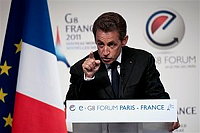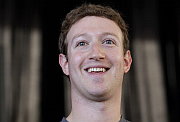Summit e-G8: tighten the Gay?
The summit’s main theme is Internet regulation.
For those who are not interested in politics at all and do not look at the zomboyaschik, brief information: tomorrow and the day after tomorrow, May 26-27, annual festivals will be held in France
 G8 Summit of Heads of State, abbreviated G8 . And here is IT, you ask. Apparently, the same question asked and French President Nicolas Sarkozy. And I decided to make IT "and", namely, to collect before the G8 summit also the heads of the most influential Internet and, in general, IT companies from the countries of this G8 itself. He succeeded in this and the meeting with the code designation e-G8 is taking place in Paris yesterday and today, that is, right now.
G8 Summit of Heads of State, abbreviated G8 . And here is IT, you ask. Apparently, the same question asked and French President Nicolas Sarkozy. And I decided to make IT "and", namely, to collect before the G8 summit also the heads of the most influential Internet and, in general, IT companies from the countries of this G8 itself. He succeeded in this and the meeting with the code designation e-G8 is taking place in Paris yesterday and today, that is, right now.Whom did Sarkozy call on this e-summit? The list is really impressive. Here are just a few famous names:
- Eric Schmidt , Google
- Mark Zuckerberg , Facebook
- Craig Mundy , Microsoft
- Jimmy Wales , Wikipedia (we all know him well in person, right? :)
- Andrew Mason , Groupon
- John Donahoe , eBay
- Jeffrey Bezos , Amazon
- Lawrence Lessig , Creative Commons (and in-between Professor at Harvard Law School)
- iron manufacturers : HP, Huawei, HTC, Qualcomm, Alcatel-Lucent;
- Telecoms : France Telecom - Orange, Telecom Italia, Eutelsat Communications, etc .;
- media corporations, content generators and other rightholders : Vivendi, Universal Music France, BBC, News Corporation (represented by Rupert Murdoch, New York Times, Wired, Financial Times, etc .;
- French and European ministers and other officials ;
- Svetlana Mironyuk , RIA Novosti (GL. Editor)
- Yuri Milner , Digital Sky Technologies (general director and co-owner, DST owns Mail.ru, partly Odnoklassniki, Vkontakte, QIWI and Facebook)
Who has already managed to speak
Nicolas Sarkozy
The main thesis
 which he tried to convey to the audience was the need to regulate the Internet, through both states and corporations. At first, he (as I understood from quotes in different media) praised Twitter and Facebook for their role in the outcome of the Arab revolutions, saying that it’s good and right to help people express their will against discredited regimes. And then he turned to the fact that uncontrolled use of the Internet is no longer possible, and states and corporations cannot remain neutral towards it. As Mr. Sarkozy fits in with one another, I have no idea. Of course, he was pushing for copyright protection, fighting cybercrime, protecting children from pornography and other Internet horrors.
which he tried to convey to the audience was the need to regulate the Internet, through both states and corporations. At first, he (as I understood from quotes in different media) praised Twitter and Facebook for their role in the outcome of the Arab revolutions, saying that it’s good and right to help people express their will against discredited regimes. And then he turned to the fact that uncontrolled use of the Internet is no longer possible, and states and corporations cannot remain neutral towards it. As Mr. Sarkozy fits in with one another, I have no idea. Of course, he was pushing for copyright protection, fighting cybercrime, protecting children from pornography and other Internet horrors.Quotes
The world that you represent here is not a "parallel universe", where legal and moral rules do not apply, and moreover, the basic rules of society in democratic countries.
Do not allow the revolution that you (technological) have begun to threaten everyone’s fundamental right to privacy and complete autonomy.
Full transparency ... sooner or later it will become one of the basic principles of individual freedom.
Eric Schmidt
Willy nilly
 he had to respond to Sarkozy’s theses. Schmidt said that technologies are developing so rapidly that governments should not try to “adjust” them, because they will change very quickly, and any problem that has arisen will be solved by technological means. "We are moving much faster than any government . " It sounds a bit defiant, if by "we" mean Google. As a hint that adjust it just will not work.
he had to respond to Sarkozy’s theses. Schmidt said that technologies are developing so rapidly that governments should not try to “adjust” them, because they will change very quickly, and any problem that has arisen will be solved by technological means. "We are moving much faster than any government . " It sounds a bit defiant, if by "we" mean Google. As a hint that adjust it just will not work.Schmidt also noted that the development of technology has led to a kind of " power shift " from governments towards individuals. This shift can manifest itself in a variety of ways, be it the publication of secret documents, the distribution of copyrighted content, or the organized uprising against the repressive regime.
')
More quotes:
In my personal opinion, most governments experience problems because of this “shift.” And instead of complaining about what everyone is doing now, why don't we think about how to tame and use it?
You need to be careful in trying to regulate new, innovative industries. Obviously, some level of regulation is necessary to protect against all kinds of adversity. But I would be very careful not to “re-adjust” the Internet.
Svetlana Mironyuk
Chief Editor
 RIA Novosti noted that the rapid development of communications, the transformation of traditional media due to changes in audience preferences and its departure to social networks require the creation of new business models in the media field, and this will obviously require a review of copyright legislation. According to her, RIA Novosti, being not only one of the largest national producers of content, but also the owner of a significant archive from the Soviet era, is extremely interested in unifying approaches and procedures in the field of copyright.
RIA Novosti noted that the rapid development of communications, the transformation of traditional media due to changes in audience preferences and its departure to social networks require the creation of new business models in the media field, and this will obviously require a review of copyright legislation. According to her, RIA Novosti, being not only one of the largest national producers of content, but also the owner of a significant archive from the Soviet era, is extremely interested in unifying approaches and procedures in the field of copyright.Now we see that the current model of copyright slows down the processes of information exchange, complicates consumer access to information, limits the growing social responsibility of media to society and often does not meet the interests of the authors themselves.
Information exchange processes, having become cross-border, require all of us to respond quickly to existing challenges, not at the national, but at the international level.
John Perry Barlow
John Perry Barlow is one of the founders and activists of the Electronic Frontier Foundation ( EFF ), a US human rights organization that specializes in protecting civil liberties and privacy on the Internet. As well as the author of the texts of the group Grateful Dead . He accepted the invitation to the summit at the last moment (although he was discouraged), therefore, in the list of participants at the office. site does not appear. As he tweeted , he felt like he was entering a lions den. At a meeting on intellectual property, he first listened and tweeted quotes.
We do not believe that it is possible to remove "content" from the Internet. If you do, what will stay there? The Internet will become mostly empty set of boxes and wires. (Hartmut Ostrowski, CEO of Bertelsmann, German media company)
When someone comes to you and says, “I need a couple hundred million dollars to make a film about three-meter blue people from another planet,” this is not an easy decision for you. But if you still accepted it and as a result you got Avatar, you still want some compensation. (20th Century Fox)
In France, some people continue to criticize it (meaning HADOPI and its three-step Internet disconnect procedures), considering it as a repressive body. In fact, he only gives a certain impulse from a pedagogical point of view. (Frederic Mitterrand, Minister of Culture and Communications of France)
When Barlow himself received the word, he expressed great surprise at his presence here, "because I myself seem to be quite from another planet."
I may be one of the few here present who really lives their lives in creating what respected gentlemen called "intellectual property." I do not see self-expression as a form of ownership. Property is something that you can take from me. Either I own it or someone else.According to Barlow, the e-G8 forum aims to “adopt as standards of the future certain business practices and authorities taken from another era, without considering whether they will be productive, whether they will give new ideas or not.” He added that he would be more interested in discussing how “to stimulate the creativity of people who really create something, and not some huge structures that have lived at the expense of the first many years.”
Self-expression is not at all like that. The point of view that self-expression is the same, is entirely a consequence of the need to “collect” this self-expression and move it somewhere. This need was before the Internet appeared, and now it is possible to do it endlessly and practically at no cost.
His performance, to his own surprise, appealed to parts of the audience. And naturally caused attacks by copyright holders. I reluctant to translate them, all theses are known there.
Mark Zuckerberg
Transparency enables
 To win the best, such as the best restaurants, he said. Now, with the help of the Internet, it is possible to collect the opinions of people, and the best things go up. This creates a more honest ecosystem ... I hope this leads to even better products.
To win the best, such as the best restaurants, he said. Now, with the help of the Internet, it is possible to collect the opinions of people, and the best things go up. This creates a more honest ecosystem ... I hope this leads to even better products.He further extended this approach to films. Despite the fact that films are advertised through Facebook, spending a lot of money, no amount of them can withstand the bad reviews that are distributed themselves in a viral way. When the film is released, people already know if it’s bad or good, and selling bad films becomes harder. And it is good, he concludes.
The trend that people get more and more opportunities to share what they want will become a trend for the next five to ten years. We are much closer to the beginning of this. We are looking for more ways for people to continue sharing theirs.
He also said that of course he would like to see his company helping companies that distribute music and other entertainment do it. But Facebook itself will not be able to create the necessary technology for this. Facebook is only a platform, he explained.
Here go and understand him what he meant. Either he tried to weigh "and yours and ours" and not offend anyone, or he frankly advertised Facebook to the public.
When asked if Facebook is going to go IPO, Mark briefly replied: “Not yet.” Interestingly, this morning, before the start of the summit, Zuckerberg had a personal meeting with N. Sarkozy.
Other topics
Telecoms do not just participate in the summit, but with their own interest. The problem was voiced by Alcatel-Lucent's Director of External Relations, Gabrielle Gothe. The proliferation and use of the Internet continues to grow, in the case of the mobile Internet simply at an explosive pace. The growth of traffic naturally requires operators to invest in the expansion and modernization of networks. And then the question arises about the fair distribution of value added between the generators of this traffic and access operators. In the understanding of telecoms, such companies and services as Apple (iTunes), Google (Youtube), Facebook, etc. are so-called. OTT operators (over-the top) operating the access network. So, roughly speaking, “it is necessary to share.” Now, all the profits from this traffic (sometimes occupying up to 30-40% of network capacity), all the laurels and all investments go to Internet companies, not to operators. Especially difficult situation in the mobile segment. Now in European mobile networks, data traffic can be 80% of the total volume, and voice traffic is only 20%. And this traffic is very poorly monetized.
Alcatel-Lucent CEO Ben Verwayen even asked Eric Schmidt if Google was planning to push telecoms off the stage altogether, leaving them to be such Internet plumbers who quietly serve their pipes (such predictions have already been expressed earlier). Schmidt replied that of course not. That demand for additional. services in mobile networks, which creates Google and others, in fact, is a growth factor for telecoms. The resulting ecosystem is beneficial to all parties. "We are incredibly interdependent."
What's next
As planned by the organizers, at the end of the forum, participants should adopt several basic theses and proposals, which will be presented and considered already at the “main” G8 summit that starts tomorrow. Why some of the delegates and go along with theses in Deauville.
Video presentations can be viewed here .
As news emerges, I will try to supplement the article with quotes from speeches by other participants. And you help links. I wonder, for example, what Milner and Lessig will say.
PS Thank you kind Habralyudyam for unexpected help in the publication of this article :)
Source: https://habr.com/ru/post/119925/
All Articles